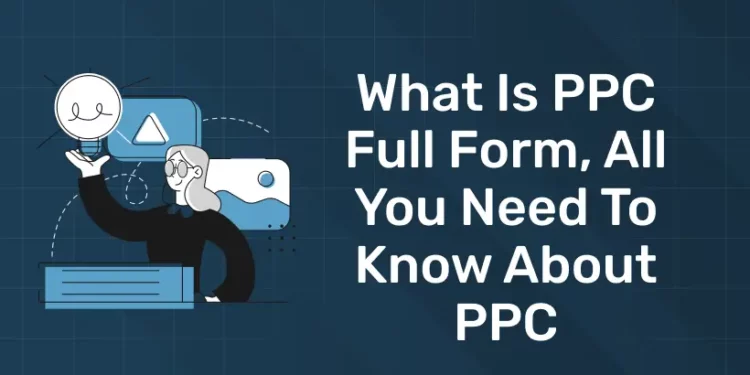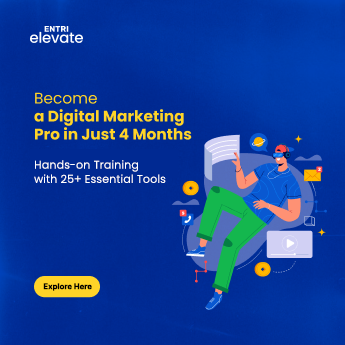Table of Contents
Through the use of pay-per-click (PPC) advertising, businesses can position themselves prominently in search engine results by paying a search engine. With this kind of online advertising, advertisers are billed every time a user clicks on their link. Only when a visitor clicks on an advertisement on the search engine or other platform and is taken to the advertiser’s website do these platforms be paid. In this article, we’ll go over PPC(Pay Per Click), its benefits, and how it operates. We’ll also look at campaign management procedures.
Learn Digital Marketing Fundamentals! Get Free Demo Here!
Introduction
In the context of Internet marketing, PPC stands for “Pay Per Click.” Pay-per-click, online advertisers are billed a fee each time one of their ads is clicked. To put it simply, you only have to pay for advertising when someone clicks on your link. In essence, it’s a method of spontaneously generating and “purchasing” website traffic.
Advertisers that use the Pay-Per-Click (PPC) internet advertising strategy must pay a fee each time their ad is clicked. It allows an advertiser to purchase website visits; they only have to pay when a user clicks on their advertisement.
What is the Full Form of PPC?
Pay Per Click is the full form of PPC. When an advertisement is clicked online, marketers pay a publisher per click, or PPC, as a kind of online advertising. Because it lets advertisers target particular keywords and demographics, pay-per-click (PPC) advertising is a popular approach to increase website traffic.
One of the most well-known forms of Pay Per Click is search engine advertising, which allows advertisers to pay for ad placement in a search engine’s sponsored links. Customers can use this by typing in a keyword related to their good or service. For example, if we bid on the keyword “Google Shopping Management,” our ad might show up at the top of the Google results page.
How Does PPC Work?
- PPC advertisements are usually shown on websites that are affiliated with the advertiser or at the top of search engine results pages (SERPs). A user is directed to the advertiser’s website when they click on one of the ads. The publisher receives a little fee from the advertiser for each click.
- Gaining an understanding of ‘What is PPC?’ could prove advantageous if you work in marketing or advertising. PPC advertising is a kind of online marketing where a business pays a charge each time a user clicks on one of their ads, resulting in an increase in natural traffic to the website.
- The intention is to elicit a specific type of user action, such registering or making a purchase. Different keywords might be used in every one of your advertising initiatives. This can make such goods or services visible to potential clients.
- A PPC advertisement may be seen by many users, but when users click on the advertisement, the advertiser is charged.
Learn Digital Marketing Fundamentals! Get Free Demo Here!
Advantages of Using PPC Advertising
PPC is among the best methods for increasing a business’s online visibility and promoting it online. The following are some advantages of PPC for business growth and operations:
Makes SEO easier
An essential part of any internet marketing strategy meant to draw in customers is search engine optimization. PPC is helpful if the business has a fantastic website but does not rank well in search results since it looks at keyword impression statistics and the number of people viewing your ads for particular words or phrases. Consequently, you can determine which of them are in demand and adjust the website’s optimization appropriately.
Makes ensuring that fees only relate to the visitors that websites receive
In alternative forms of advertising, advertisers pay for campaign promotion without any guarantee of desired outcomes. Because pay-per-click (PPC) ensures that advertisers only pay for actual website clicks, it is ideal for those who wish to track clicks and demand real interaction. When implementing pay-per-click, there is a definite correlation between performance and cost.
Gives a lot of information
About the performance of the advertisement, you have a lot of information. The advertiser can access comprehensive campaign status information via the PPC platform. PPC analytics contain information on impressions, clicks, and conversions.
Provides optimization
It is simpler to assess whether an advertisement is effective and adjust the approach based on data such as click-through rate and conversion rate. Creating multiple variations of each advertisement and comparing them to see which ones work best is the optimal approach. In this manner, you can steadily raise a website’s organic traffic.
Aids in managing budget
You may carefully manage your budget for advertising campaigns when you use PPC. Setting a daily spending cap is possible with PPC models. This implies that marketers can afford them, which can aid in organizing the distribution of resources for each campaign.
Increases visibility
Using PPC, you may place your ads on some of the most well-known websites that people frequently visit, like social networks and search engines. PPC ads have the potential to increase website exposure, which in turn may raise the ad’s click-through rates. By doing this, the website may be positioned more favorably on search engine results pages (SERP).
Affordable
Ad placements, targeting, and budget can all be set with a well-designed PPC campaign. You just pay when someone sees your website, therefore it can be a good financial value. The company’s marketing goals and financial situation will determine how much you can invest in these initiatives.
Quick traffic
PPC is still advantageous for focusing on particular traffic. The location, language, keywords, time, date, and even kind of device can all be used to target your audience. Ad retargeting is another option that you have. It displays your advertisement to those who have already visited your website.
Good leads
PPC is a useful strategy for any website or business that produces online leads. Making your adverts at the appropriate moment is crucial. This could lead to more clicks and more encouragement for customers to buy a good or service.
Support SEO strategy
Prior to using your keywords in extensive search engine optimization (SEO) campaigns, PPC enables you to test them. Although increasing organic keyword conversion rates may be challenging, you can use PPC keyword data to influence your market tactics for organic searches. Once you know which keywords lead to paid ads, you may use that information to better improve a website’s headlines and metadata.
Learn Digital Marketing Fundamentals! Get Free Demo Here!
Where to Learn PPC(Pay Per Click)?
1: What is the primary goal of SEO (Search Engine Optimization)?
Pay-Per-Click, or PPC, is a potent internet advertising method that can assist companies in expanding their clientele and attracting new ones. Businesses may maximize the effectiveness of their PPC campaigns and enhance their PPC outcomes by utilizing PPC management services.
Are you interested in learning PPC(Pay Per Click)? Do you prefer PPC ads over others? Or perhaps social media is your thing. Entri Elevate digital marketing courses offer valuable knowledge and skills for success in the digital era. Before deciding which classes would be most appropriate for your needs, spend some time to investigate all three of these areas if you are unsure of what kind of class would be most helpful. Doing some research will not only help you focus your search, but it will also enable you to understand details rather than generic information that might not directly relate to your hobbies or areas of most excitement regarding digital marketing.
| Explore These High Demand Marketing Course | |
| Digital marketing Training | Performance marketing Course |











